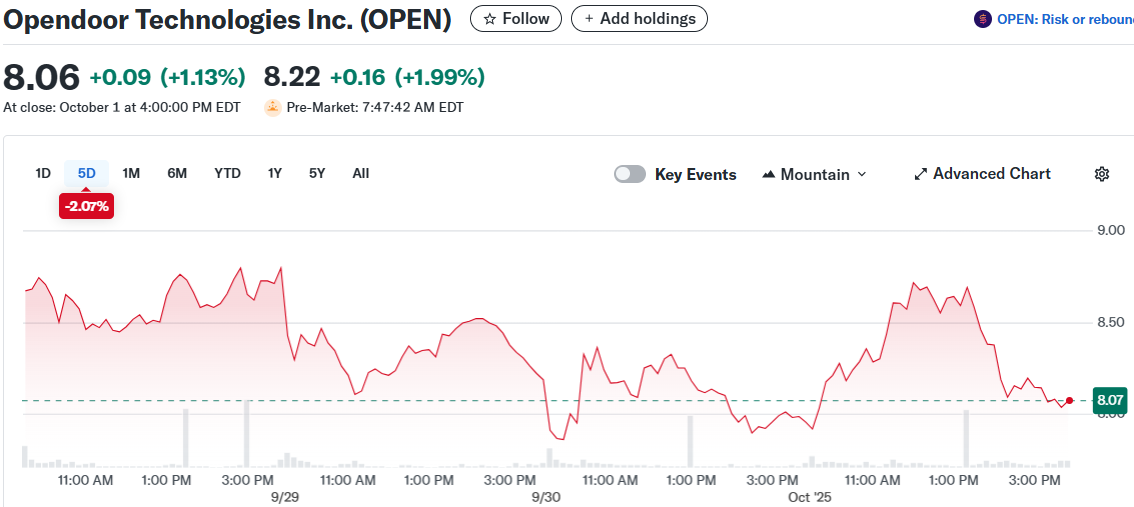TLDR
- Opendoor’s gross profit margin sits at just 8.2%, with cost of sales eating up roughly 92% of revenue
- The company posted a net loss last quarter despite revenue climbing nearly 4% to $1.6 billion
- Co-founder Eric Wu purchased $2 million worth of shares at $6.65 each, buying 300,752 shares
- New CEO Kaz Nejatian plans to use AI to improve pricing, marketing, and home assessments
- Both Zillow and Redfin previously exited the iBuying business due to unpredictable home price forecasting
Opendoor Technologies co-founder Eric Wu just made a $2 million bet on his own company. The director purchased 300,752 shares at $6.65 each this week, pushing his direct stake to almost 1.95 million shares.

The timing is interesting. Opendoor has been struggling with a problem that’s haunted the iBuying business for years: razor-thin margins.
The company’s most recent quarter shows the challenge clearly. Revenue climbed nearly 4% to $1.6 billion for the period ending June 30. But gross profit actually declined year over year, dropping from $129 million to $128 million.
Day 44 — today I want to dedicate this to Captain Mike in the Bering Sea. He’s out there for weeks at a time, fighting forty-foot waves, hauling cod, and still finding a way to believe in $OPEN and Rising Dynasty.
He told me about the hospital bills, his son’s wrecked truck, and… pic.twitter.com/zEtMOY1BFq
— Eric Jackson (@ericjackson) October 1, 2025
That puts gross profit at just 8.2% of revenue. In other words, cost of sales accounts for roughly 92% of what Opendoor brings in.
For an iBuying business, those costs include what the company pays for houses, plus repairs, renovations, and other expenses before selling. The gap between purchase price and sale price needs to be wide enough to cover those costs and still leave room for profit.
Right now, that gap isn’t wide enough.
Even with operating expenses dropping 30% to $141 million last quarter, Opendoor still posted a net loss. The company has now reported losses in each of its past four quarters.
The iBuying Problem That Sank Competitors
Opendoor isn’t the first to struggle with this business model. Both Zillow and Redfin tried their hand at iBuying before walking away.
Zillow’s then-CEO Rich Barton explained the exit bluntly. He said “the unpredictability in forecasting home prices far exceeds what we anticipated.” The business created too much volatility.
For Opendoor to succeed where these competitors failed, it needs either cheaper inventory or higher sale prices. Getting consistently good deals on houses while spending less on fixes isn’t easy. And counting on buyers to overpay only works when the market is red hot.
New CEO Kaz Nejatian, who took over in September, thinks AI might be the answer. He plans to use artificial intelligence to improve the company’s pricing engine, handle marketing tasks, and make in-home assessments more efficient.
What the Numbers Say
The stock has been on a wild ride this year. Shares are up roughly 410% year to date as of late September. But that surge comes with a warning label.
The gains appear driven more by speculation than fundamentals. Without a real improvement in gross margins, the path to profitability remains unclear.
Operating expenses came down significantly last quarter, which helps. But when gross profit barely breaks 8%, there’s not much cushion. The best-case scenario right now involves continuing to cut overhead while hoping margins inch up enough to flip from losses to tiny profits.
That’s a tough position for any business. Wu’s purchase signals he thinks the company can work through it. Shares ticked up 0.63% in after-hours trading Tuesday to $8.02 following news of the insider buy.
His direct stake now stands at nearly 1.95 million shares. For a co-founder to put $2 million of personal money into the stock sends a message about his view of the company’s prospects.
The question is whether AI tools and operational improvements can solve what amounts to a structural margin problem. Opendoor needs to prove it can consistently buy and sell homes at prices that leave enough room for profit after all the costs in between.
Mortgage rates have been coming down, which could help boost housing activity. More transactions give Opendoor more chances to find deals that work. But volume alone won’t fix the margin issue if each sale still barely clears 8% gross profit.
Wu’s purchase came at $6.65 per share. The stock closed at $8.06 on October 1, already above his purchase price.






